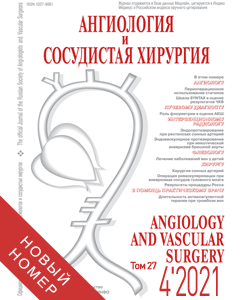Journal «Angiology and Vascular Surgery» •
2000 • VOLUME 6 • №1
EFFECT OF COLESTID ON PLASMA LIPOPROTEINS AND HEMOSTATIC COMPONENTS IN PATIENTS WITH HYPERCHOLESTEROLEMIA IIA
O.S. Bulkina, A.M. Kravetz, A.B. Dobrovolsky, E.P. Panchenko, Yu.A. Karpov
Department of Angiology A.L. Myasnikov Institute of Clinical Cardiology,
Russian Cardiologic Scientific and Industrial Complex,
Moscow, Russia
The aim of the study was the investigation of components of lipid-transport and hemostatic systems during treatment of hyperlipidemia. 48 patients with hyperlipidemia IIa after 2 months of vigorously controlled diet started treatment with Colestid (4 gm BID) for at least 2 months. Venous blood samples for measurements of lipids, fibrinogen, factors II and VII, protein С and inhibitor of tissue plasminogen activator (PAI-1) were taken before and after diet period, after 8 and 16 weeks of treatment. Main changes of lipids were observed after the first two month of treatment: total cholesterol decreased from 7.63±0.09 to 6.46±0.11 mmol/1, LDL-cholesterol decreased from 5.58±0.09 to 4.4±0.11 mmol/1, HDL-cholesterol and triglycerides did not change significantly. We observed significant decrease of Fg after period of diet level of Fg after treatment did not change. Among 3 studed vitamin K-dependent proteins only FII decreased after treatment. This decrease may reflect the correlation between TC and factor II. Decrease of PAI-1 antigen without change of activity may reflect the decrease of degree of platelet activation after correction of hyperlipidemia.
KEY WORDS: colestid, hyperlipidemia, hemostasis system.
P. 17
ARCHIVES MAGAZINE
2021 (Vol.27)
2020 (Vol.26)
2019 (Vol.25)
2018 (Vol.24)
2017 (Vol.23)
2016 (Vol.22)
2015 (Vol.21)
2014 (Vol.20)
2013 (Vol.19)
2012 (Vol.18)
2011 (Vol.17)
2010 (Vol.16)
2009 (Vol.15)
2008 (Vol.14)
2007 (Vol.13)
2006 (Vol.12)
2005 (Vol.11)
2004 (Vol.10)
2001 (Vol.7)
2000 (Vol.6)
1999 (Vol.5)
1998 (Vol.4)
1997 (Vol.3)


